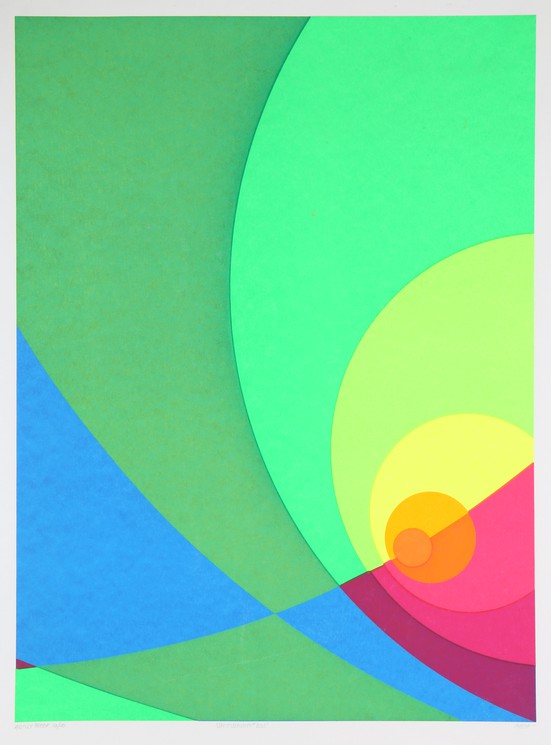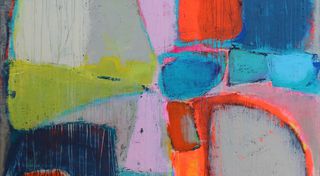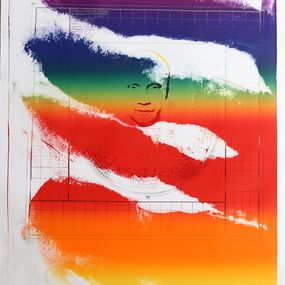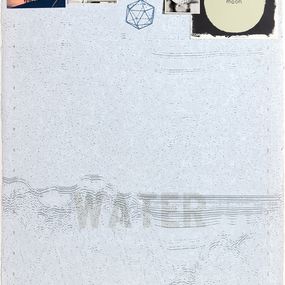
Split Infinity #B3S,
1980
Herbert Aach
Print : Screen Print
106.7 x 76.2 cm 42 x 30 inch
Free returns within 14 days
Authenticity guaranteed
Learn moreSecure payment
About the artwork
Type
Numbered and limited to 220 copies
Signature
Hand-signed by artist
Authenticity
Sold with certificate of Authenticity from the gallery
Invoice from the gallery
Medium
Dimensions cm • inch
106.7 x 76.2 cm 42 x 30 inch Height x Width x Depth
Support
Framing
Not framed
Artwork sold in perfect condition
Artwork location: United States
Artist: Herbert Aach Title: Split Infinity #B3S Year: 1980 Medium: Serigraph, signed and numbered in pencil Edition: 200; 20 AP Paper Size: 42 in. x 30 in. (106.68 cm x 76.2 cm)

Presentation
Herb Aach (1923–1985) was an American painter and writer. Aach's painting style is known for its intense and well placed pigmentation, which stemmed from his deep interest in color theory and color relationships. This interest in color theory and philosophy would lead him to write one of the most notable translations of Goethe's Color Theory.
He was interested in all phases of color, phenomenology, perception, and fluorescence. He taught at the Pratt Institute (1947-51, 1965-68) the Brooklyn Museum, the Skowhegan School of Painting & Sculpture (1969-70), and was an assistant professor at Queens College from 1966.
Herb Aach was born in Cologne, Germany in 1923. It was in Germany where Aach would be exposed to fine art, studying under German expressionist painter Ludwig Meidner. Nazi persecution caused his family to flee, and in 1938 he arrived in New York City. In 1942 he enlisted in the United States Army and a year later he became a U.S. citizen. After serving during World War II, in Kassel, Germany, he returned to New York in 1946 where he studied under John Ferren and Rufino Tamayo at the Brooklyn Museum Art School. In 1948 he moved, with his new wife, to Mexico City where he continued his fine art studies at Escuela de Pintura y Escultura.
Upon returning from Mexico, Aach would practice painting in what was described as "relative isolation," between 1954-1963 in Hazleton, Pennsylvania. He would eventually move back to New York City in 1963 and began teaching at Queens College in 1965, where he would continue to teach for the rest of his life.
At Queens he taught studio art and color theory and became a favorite of students, gaining tribute in the 1968 school yearbook and voted twice as "Teacher of the Year". He would serve as chairman of the arts department from 1976-1979. He also taught at the Pratt Institute from 1966-1969. In the 1970s Aach visited East Germany to participate in the International Research and Exchanges Board outreach program to broaden cultural exchanges between the West. While in East Germany he studied at the Goethe archives in Weimar and became interested in rose windows. Back in New York, he worked with city officials to paint city bridges bright colors, such as the Madison Avenue Bridge which was painted lavender. He became president of the Artists Technical Research Institute in 1975. In 1979 he was diagnosed with cancer and due to illness he became unable to paint, taking up drawing as his main format.
He died October 14, 1985 of cancer at the Memorial Sloan–Kettering Cancer Center.
As translator of Goethe's color theory, Aach can be associated with painter Robert Delaunay as well as with Alfred Jensen. His paintings and works on paper largely consist of variations on different shape and color combinations.
Louis Finkelstein described Aach's work as being heavily "located in cultural tradition" in relation to his influences, those he influenced, and the skills and styles of Irish manuscripts, textiles, Chinese and Colombian art. In 1974 art critic Noel Frackman declared Aach a pioneer.
Select Exhibitions
Mint Museum, 1987, Charlotte, North Carolina
Bronx Museum of the Arts, 1977, New York, New York
Albright-Knox Art Gallery, 1975, Buffalo, New York
Drew University, 1971, Madison, New Jersey
Pennsylvania State University, 1962, State College, Pennsylvania
Everhart Museum, 1959, Scranton, Pennsylvania
Whitney Museum of American Art, 1952; 1956, New York, New York
Select Collections
Albright-Knox Art Gallery
Corcoran Gallery of Art
Metropolitan Museum of Art
State Museum of Pennsylvania
Colorful Geometric Painters
Printmakers
German artists
More works from RoGallery
Artsper delivers internationally. The list of countries is available in the first step of your cart.
If your country is not listed contact us at [email protected] and we will see what we can do.
Note that Customs fees may apply for works shipped internationally. This is indicated in the first step of the shopping cart.
You can choose a delivery address different from the billing address. Make sure that a trusted person is present to receive the work if you cannot be there.
Have you purchased a painting, sculpture or work on paper?
Find our expert advice for the conservation and promotion of your works in the articles below:
Artsper offers you access to more than 200,000 works of contemporary art from 2,000 partner galleries. Our team of experts carefully selects galleries to guarantee the quality and originality of the works.
You benefit from:
-
Works at gallery price
-
Return within 14 days, regardless of your location
-
Easy resale of the work purchased on Artsper
-
Personalized research tools (selection and tailor-made universe)
Our customer service is available for any assistance.
At Artsper, our mission is to allow you to collect works of art with complete peace of mind. Discover the protections we offer at every stage of your shopping experience.
Buy works from top galleries
We work in close collaboration with carefully selected art galleries. Each seller on Artsper is carefully examined and approved by our team, thus ensuring compliance with our code of ethics. You therefore have the assurance of purchasing authentic, high-quality works.
Total transparency: you know what you are buying
Before being posted online, all artwork on Artsper is reviewed and validated by our moderation team. You can browse with complete peace of mind, knowing that each piece meets our criteria of excellence.
Personalized support: our experts at your service
Our team of contemporary art experts is available by phone or email to answer all your questions. Whether you want advice on a work or a tailor-made selection to enrich your collection, we are here to support you.
Resell your works with ease
If you have purchased a work on Artsper and wish to resell it, we offer you a dedicated platform to relist it. To find out more, click here.
Make offers with Artsper: negotiate like in a gallery
You have the possibility to propose a price for certain works, just like in a gallery. This feature allows you to initiate discussions and potentially acquire your coins at advantageous prices.
Get help with your negotiations
Our team will negotiate for you and inform you as soon as the best offer is obtained. Do not hesitate to call on our expertise to ensure a transaction at the best price.
Order securely
Artsper satisfaction assurance
We want you to be completely satisfied with your purchase. If the work you receive is not to your liking, you have 14 days to return it free of charge, and you will be refunded in full, whatever the reason.
Secure payment with Artsper partners
All credit card payments are processed by Paybox, the world leader in payment solutions. Thanks to their strict security standards, you can transact with confidence.
Problem Support
In the rare event that an artwork arrives damaged or not as described, we are here to help. Whether for a return, refund, restoration or exchange, our team will support you throughout the process and will ensure that we find the solution best suited to your situation.
Conditions to benefit from Artsper protections:
-
Use one of the payment methods available on Artsper for your order.
-
Report any problems within one week of receiving the work.
-
Provide required photographic evidence (including original artwork and packaging).
Artsper guarantees cover the following cases:
-
The received work lacks a described characteristic (for example, a signature or frame).
-
The artwork has significant differences from its description (e.g. color variation).
-
The work is damaged upon receipt.
-
The work is lost or damaged by the carrier.
-
Delivery is significantly delayed.
With Artsper, you collect with complete peace of mind.














